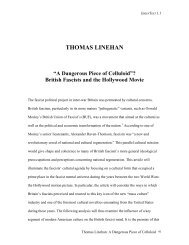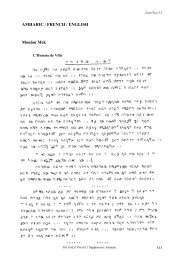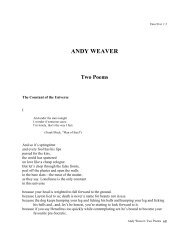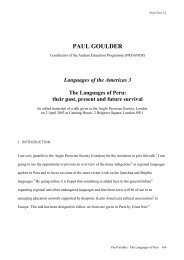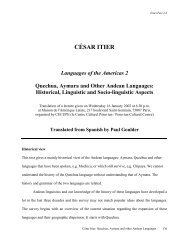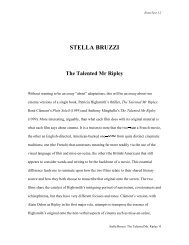Thomas Lamarre: An Introduction to Otaku Movement - Arts @ Brunel
Thomas Lamarre: An Introduction to Otaku Movement - Arts @ Brunel
Thomas Lamarre: An Introduction to Otaku Movement - Arts @ Brunel
You also want an ePaper? Increase the reach of your titles
YUMPU automatically turns print PDFs into web optimized ePapers that Google loves.
EnterText 4.1<br />
Mario Tronti calls a “strategy of refusal.” 22 The non-quantifiable work of otaku poses a<br />
challenge <strong>to</strong> received organisations of labour. When faced with their inability <strong>to</strong> direct or<br />
harness otaku movement, corporations call it theft or piracy.<br />
On the other hand, the kinds of work associated with otaku seem already subject<br />
<strong>to</strong> constitutive power in the workplace. Collecting, exchanging, translating manga and<br />
anime, which commonly entails downloading, posting, converting files—aren’t these<br />
sorts of activities already codified in the workplace, as a form of communicative labour?<br />
In this respect, otaku movement appears as part of a general postmodernisation of<br />
society, as part of those transformations in the labour process that have been discussed in<br />
such terms as post-Fordism, flexible accumulation or cultural economy. “Essentially,” <strong>to</strong><br />
quote John Kraniauskas, such changes in processes of production “involve the<br />
technological harnessing of the superstructure by the economic base, a ‘cultural turn’ in<br />
production putting entertainment, the symbols and electronic syntax of the information<br />
highways, social knowledges and affect <strong>to</strong> work.” 23 In sum, the so-called unofficial work<br />
associated with otaku hovers between strategies of work refusal and the postmodern<br />
harnessing of communicative labour. <strong>Otaku</strong> movement arises with the his<strong>to</strong>rical<br />
transformation of processes of production and labour, and maybe serves as a site of<br />
articulation between economies. <strong>Otaku</strong> movement—as unofficial work—is at once labour<br />
and not labour.<br />
<strong>Otaku</strong> no Video offers both possibilities at once, by stressing the oscillation<br />
between discipline and self-cultivation. The statistical information that accompanies each<br />
portrait of an otaku, for instance, not only gives the impression that otakudom is far more<br />
pervasive than anyone suspects (thus implying the otaku activities are already eroding<br />
<strong>Thomas</strong> <strong>Lamarre</strong>: <strong>Otaku</strong> <strong>Movement</strong> 168



